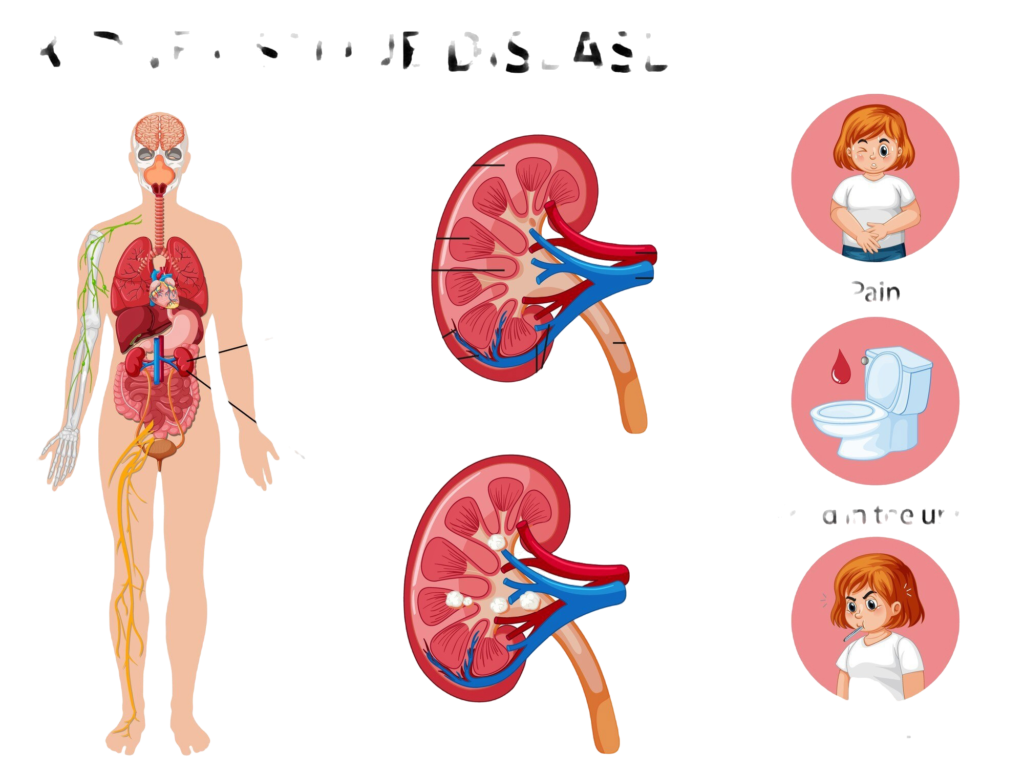
Overview
Our kidneys are powerhouse organs essential for filtering blood, balancing electrolytes, regulating blood pressure, and producing hormones. Their complex functions are vital for our overall health. Yet, certain conditions can impair kidney function, sometimes leading to chronic issues or irreversible damage. Understanding the most common kidney-related conditions is crucial to managing risk factors, recognizing symptoms, and taking preventive steps to safeguard kidney health.
This guide will cover the major health issues that can impact kidney function, including chronic kidney disease, hypertension, and diabetes, alongside lesser-known conditions like kidney stones and polycystic kidney disease. We’ll also discuss lifestyle choices and practices that promote kidney health, equipping you with the information you need to support these vital organs.
The Role of the Kidneys in Health
Kidneys are responsible for several functions essential to maintaining homeostasis, or balance, within the body. The two kidneys, each about the size of a fist, filter approximately 120–150 quarts of blood daily to produce 1 to 2 quarts of urine, eliminating waste and extra fluids from the body. Key functions of the kidneys include:
- Filtering Waste: Kidneys remove waste products and excess substances from the bloodstream, excreting them in the urine.
- Balancing Electrolytes: They regulate essential electrolytes like sodium, potassium, and calcium, which are critical for cellular functions.
- Blood Pressure Regulation: Kidneys help control blood pressure by managing fluid levels and releasing a hormone called renin, which constricts blood vessels when needed.
- Bone Health: By producing active vitamin D, kidneys contribute to calcium balance, promoting strong bones.
- Red Blood Cell Production: They release erythropoietin, a hormone that stimulates the production of red blood cells in response to low oxygen levels
Given these roles, any decline in kidney function can disrupt multiple bodily systems, impacting everything from blood pressure to bone health. Let’s look into the key conditions that may compromise kidney health and how to manage them effectively.
Major Conditions That Affect Kidney Health
Chronic Kidney Disease (CKD)
Chronic Kidney Disease is a progressive loss of kidney function over months or years. This condition can advance silently, showing few symptoms until significant kidney damage has occurred. CKD is primarily caused by high blood pressure, diabetes, and other metabolic conditions
Related : 10 Best Foods to Hair Health and Strength
- Stages of CKD: CKD progresses through five stages, with the fifth stage being end-stage renal disease (ESRD), where the kidneys function at less than 15% of their normal capacity.
- Symptoms: Early CKD often has no symptoms, but advanced stages may include swelling in the legs and feet, fatigue, high blood pressure, and reduced appetite.
- Diagnosis: CKD is diagnosed through blood tests (measuring creatinine levels and calculating estimated glomerular filtration rate, or eGFR) and urine tests (checking for albumin).
- Management and Prevention: Managing CKD involves controlling blood pressure, regulating blood sugar levels, and adopting a kidney-friendly diet low in sodium and protein. Regular check-ups are essential for tracking kidney function and adjusting lifestyle or medications accordingly. A nephrologist (kidney specialist) may prescribe ACE inhibitors or ARBs, which are medications that help lower blood pressure and protect kidney function
Related : How to Lose Belly Fat 6 Tips for a Healthier You
Hypertension (High Blood Pressure)
Hypertension, or high blood pressure, is both a cause and consequence of kidney disease. Elevated blood pressure can damage blood vessels in the kidneys, reducing their ability to filter blood effectively. This condition is often called the “silent killer” because it has no symptoms until significant damage has occurred.
- Connection to Kidney Health: High blood pressure damages the small blood vessels in the kidneys, leading to conditions like glomerulosclerosis, where scar tissue forms, impairing kidney function.
- Prevention and Management: Lifestyle changes, such as reducing sodium intake, increasing physical activity, maintaining a healthy weight, and avoiding smoking, can lower blood pressure. Medications may also be prescribed to control blood pressure and protect kidney health
Diabetes and Kidney Disease
Diabetes, particularly uncontrolled diabetes, is a leading cause of kidney damage. Over time, high blood sugar levels damage the kidney’s filtering units, leading to a condition called diabetic nephropathy.
- Mechanism: Elevated blood glucose levels damage blood vessels in the kidneys, impairing their ability to filter blood efficiently.
- Risk Factors: People with long-standing or poorly controlled diabetes, high blood pressure, and high cholesterol are at higher risk.
- Prevention and Management: Good blood sugar control is key to preventing diabetic nephropathy. This includes regular monitoring, medication adherence, and lifestyle choices like a balanced diet low in processed sugars. Diabetics are advised to undergo regular kidney function tests (e.g., urine albumin test and eGFR) to monitor kidney health closely
Related : Top 7 Health Benefits and Uses of Cayenne Pepper
Glomerulonephritis
Glomerulonephritis is an inflammation of the glomeruli—the tiny filtering units in the kidneys. This condition can arise from infections, autoimmune diseases, or genetic factors, and can be either acute (sudden onset) or chronic (long-term).
- Symptoms: Glomerulonephritis can cause blood in the urine, swelling (especially in the face, hands, feet, and abdomen), and high blood pressure.
- Causes: It may result from autoimmune diseases like lupus, bacterial or viral infections, or chronic diseases.
- Treatment: Treatment depends on the underlying cause but may include medications to control blood pressure, diuretics to reduce swelling, and immunosuppressive drugs if an autoimmune disease is involved.
Kidney Stones
Kidney stones are hard mineral and salt deposits that form within the kidneys, causing intense pain and sometimes obstructing urine flow. Factors contributing to kidney stones include dehydration, high-sodium diets, and genetic predisposition.
- Symptoms: Sudden and severe pain in the side or back, blood in the urine, nausea, and frequent urination are common symptoms of kidney stones.
- Risk Factors: Dehydration, high-protein diets, excessive salt intake, and family history can increase the risk
Related : 20 Best Low-Carb Fruits and vegetables to Enjoy on a Keto Diet
- Prevention and Treatment: Drinking plenty of water, reducing salt intake, and eating a balanced diet can help prevent stone formation. For treatment, smaller stones may pass naturally, while larger stones may require medical intervention, such as lithotripsy (using shock waves to break the stones) or, in severe cases, surgery
Polycystic Kidney Disease (PKD)
Polycystic Kidney Disease is a genetic disorder that causes cysts to form in the kidneys, potentially leading to enlarged kidneys and reduced function. These cysts are fluid-filled sacs that vary in size and can multiply over time, often resulting in kidney failure.
- Symptoms: PKD symptoms include high blood pressure, back or side pain, and blood in the urine. Cysts can also cause abdominal fullness and increase the risk of kidney infections.
- Types: PKD can be autosomal dominant (ADPKD) or autosomal recessive (ARPKD), with ADPKD being more common and usually developing in adulthood.
- Management: There is currently no cure for PKD, but treatment focuses on managing symptoms. Blood pressure control is crucial to slowing disease progression, and patients are advised to avoid contact sports to prevent cyst rupture. In advanced cases, dialysis or a kidney transplant may be necessary.
Lifestyle Tips for Kidney Health
Adopt a Kidney-Friendly Diet

Eating a balanced diet is crucial for kidney health. Foods rich in fiber, such as fruits, vegetables, and whole grains, support overall health and help manage blood pressure and blood sugar levels.
- Limit Sodium: High sodium intake can increase blood pressure, putting strain on the kidneys. The recommended daily sodium intake is about 1,500 to 2,300 mg, which means avoiding processed foods and choosing fresh, whole foods whenever possible.
- Watch Protein Intake: Excessive protein can strain kidneys, especially for those with existing kidney conditions. Lean protein sources, like fish, skinless poultry, and legumes, are preferable.
- Hydrate Properly: Staying hydrated helps kidneys flush out toxins, but too much water can also strain them, especially for those with reduced kidney function. Aim for 8 cups a day, adjusting based on individual needs and physical activity levels.
Exercise Regularly

Regular physical activity can help control weight, blood pressure, and blood sugar, all of which are important for kidney health. Aim for at least 150 minutes of moderate-intensity exercise weekly, such as walking, cycling, or swimming.
Avoid Smoking and Limit Alcohol
Smoking and excessive alcohol intake can lead to high blood pressure, diabetes, and heart disease, all of which are risk factors for kidney disease. Quitting smoking and limiting alcohol can improve overall kidney health and reduce the risk of chronic diseases
Be Cautious with Over-the-Counter Pain Relievers
Non-steroidal anti-inflammatory drugs (NSAIDs) like ibuprofen and aspirin can damage the kidneys when used excessively. If you need long-term pain management, talk to your doctor about alternatives
Regular Check-Ups and Screening
Regular health check-ups are essential for early detection of kidney problems, especially for individuals at higher risk, such as those with diabetes, high blood pressure, or a family history of kidney disease. Early screenings allow doctors to monitor kidney function through tests like blood pressure checks, blood tests for creatinine levels, and urine tests for protein (albumin). Early detection can be critical in slowing disease progression, managing symptoms effectively, and making lifestyle adjustments to support kidney health
Related ; The Best Supplements to Support Brain Health
Doctors may recommend annual kidney function tests, especially for high-risk individuals, to monitor and detect any potential issues. These preventive screenings can make a difference in long-term kidney health, enabling timely interventions before kidney damage becomes severe.
The Takeaway
Kidney health is central to our overall well-being, given the critical role kidneys play in filtering blood, balancing electrolytes, and regulating essential hormones. The wide range of conditions that can affect the kidneys—from chronic kidney disease and hypertension to diabetes and kidney stones—emphasizes the importance of proactive health management
By maintaining a balanced diet, staying active, managing blood pressure and blood sugar, and avoiding smoking or excessive alcohol, we can significantly reduce our risk of kidney problems. Regular check-ups and screenings further support early detection and effective management of any emerging issues, safeguarding kidney health for the long term.
Taking these preventive measures not only supports the kidneys but also contributes to a healthier, more balanced lifestyle. Prioritizing kidney health now can help ensure that these essential organs function optimally for years to come
Frequently Asked Questions
- Why are the kidneys important for overall health?
Kidneys play a crucial role in filtering waste and excess fluids from the blood, balancing electrolytes, and regulating blood pressure. They also produce essential hormones that help manage blood pressure, red blood cell production, and calcium balance, making them vital for maintaining overall health.
- What are the most common conditions that affect kidney health?
Common kidney conditions include chronic kidney disease (CKD), kidney stones, high blood pressure-related kidney damage, diabetes-related kidney issues, and kidney infections. Each condition affects kidney function differently and requires unique treatment approaches.
- How can I prevent kidney disease?
Key preventive measures include maintaining a balanced diet low in salt and sugar, staying hydrated, managing blood pressure and blood sugar levels, limiting alcohol and avoiding smoking, staying physically active, and getting regular kidney screenings if you’re at higher risk
- What are the signs of kidney disease?
Early signs of kidney disease may include fatigue, swelling in the ankles or around the eyes, changes in urination, foamy urine, and high blood pressure. If left unchecked, symptoms can progress to nausea, shortness of breath, and other complications. Early detection through regular check-ups is essential.
- Who is at higher risk for kidney disease?
Individuals with diabetes, high blood pressure, a family history of kidney disease, or those over the age of 60 are at a higher risk. People with these risk factors should be proactive about kidney health and consider regular check-ups to monitor kidney function











